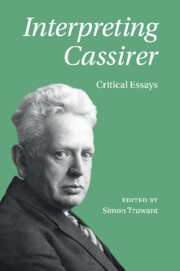Book contents
- Interpreting Cassirer
- Interpreting Cassirer
- Copyright page
- Contents
- Contributors
- Acknowledgments
- Abbreviations
- Introduction
- Part I Cassirer’s Philosophy of Culture
- Chapter 1 Interaction between Language and the Other Symbolic Forms
- Chapter 2 The Status of Art in Cassirer’s System of Culture
- Chapter 3 Being in Time
- Chapter 4 Science As a Symbolic Form: Ernst Cassirer’s Culture of Reason
- Chapter 5 Quantum Mechanics As the Ultimate Mode of Symbol Formation
- Chapter 6 Spirit in the Age of Technical Production
- Chapter 7 Political Myth and the Problem of Orientation
- Part II Cassirer’s Philosophy of Consciousness
- Part III Cassirer’s Philosophical Method
- Bibliography
- Index
Chapter 6 - Spirit in the Age of Technical Production
from Part I - Cassirer’s Philosophy of Culture
Published online by Cambridge University Press: 17 April 2021
- Interpreting Cassirer
- Interpreting Cassirer
- Copyright page
- Contents
- Contributors
- Acknowledgments
- Abbreviations
- Introduction
- Part I Cassirer’s Philosophy of Culture
- Chapter 1 Interaction between Language and the Other Symbolic Forms
- Chapter 2 The Status of Art in Cassirer’s System of Culture
- Chapter 3 Being in Time
- Chapter 4 Science As a Symbolic Form: Ernst Cassirer’s Culture of Reason
- Chapter 5 Quantum Mechanics As the Ultimate Mode of Symbol Formation
- Chapter 6 Spirit in the Age of Technical Production
- Chapter 7 Political Myth and the Problem of Orientation
- Part II Cassirer’s Philosophy of Consciousness
- Part III Cassirer’s Philosophical Method
- Bibliography
- Index
Summary
Nicolas de Warren examines not just a lesser-known text by Cassirer – Form and Technology – but also a symbolic form that has received little attention. This chapter reconstructs Cassirer's contribution to the animated debates about the value and dangers of technological power in Germany after the First World War. On the one hand, De Warren examines both the affinity and the differences between technical artefacts and language (as tools) and between technological and mythical consciousness (as magical), thus cutting out an indispensable role for the symbolic form of technology within the whole of human culture. At the same time, De Warren presents Cassirer's understanding of this form as indicative for his overall view of the relation between form and freedom, thus illustrating Cassirer's assessment of modern thought. Ultimately, technology is shown to have a moral status for Cassirer (only) in the sense that it strives toward the self-realization of human freedom.
- Type
- Chapter
- Information
- Interpreting CassirerCritical Essays, pp. 109 - 129Publisher: Cambridge University PressPrint publication year: 2021
- 1
- Cited by

